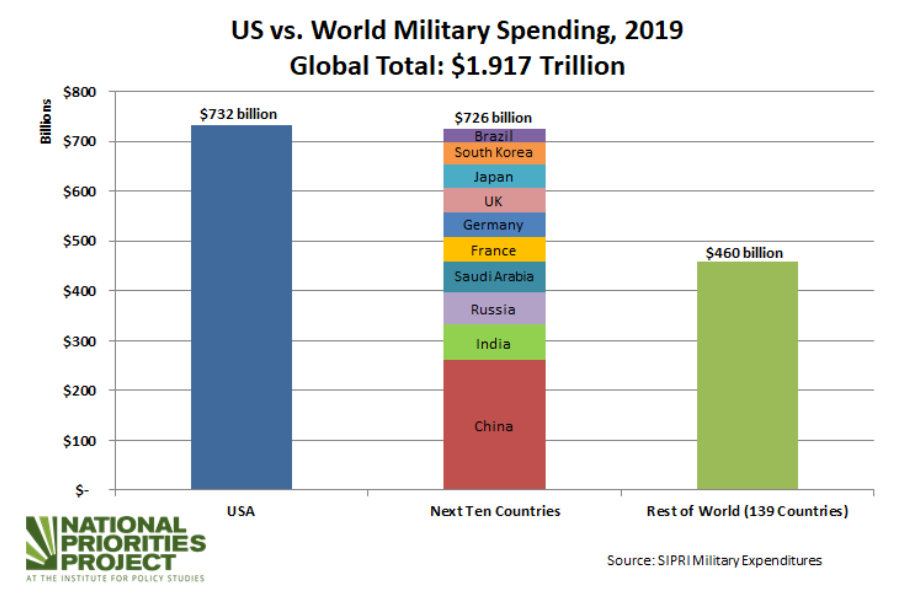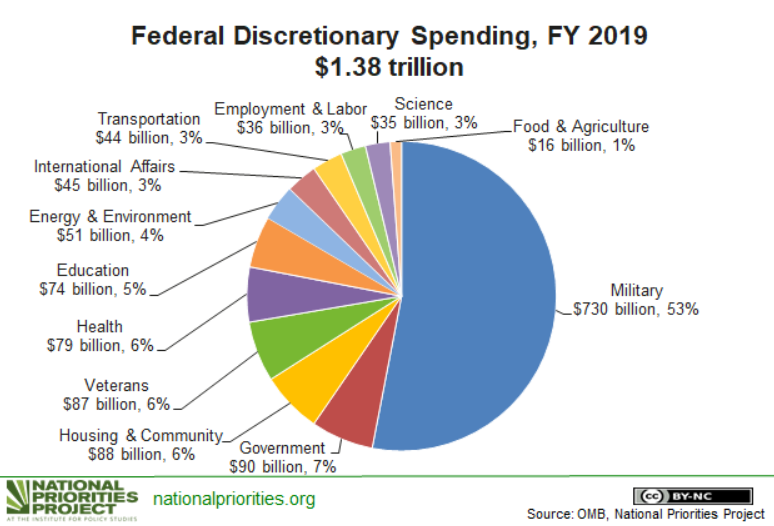Defunding The Police Means Defunding The Pentagon, Too.
NPP Pressroom
Medium
Meg Gio
06/28/2020
Discourse around this most recent wave of the Movement for Black Lives has really honed in on defunding the police, a step toward the end goal of total abolition. Abolitionists have been advocating this for years, recognizing the destruction the prison-industrial complex and racist, capitalist institutions like police forces in general have had on not only people of color, but our societal priorities as a whole.
[...]
What are we prioritizing with our budgets?
The relationship between the US military and police goes beyond the gifting of surplus supplies to local police forces, which hyper-militarizes cops and is a huge problem in and of itself. When talking about this intricate web of “industrial complexes”, I’m talking about money.
The Pentagon budget has increased dramatically since 2000, totaling almost three quarters of a trillion dollars in 2019. Last year’s budget amounted to 64.5 percent of US discretionary spending. According to the National Priorities Project, an organization that’s been working on redirecting military funds toward domestic programs since 1983, the US “national security” budget can be defined to include not only the various branches of the military, but also veterans’ affairs and homeland security spending, which brings us to “estimates approaching or exceeding $1 trillion per year. That amount approaches the size of the entire U.S. discretionary budget.”

This is taxpayer money funneling away from desperately needed domestic social services and toward US imperialism abroad. If we’re talking about defunding the police and redistributing wealth to benefit local communities, then we need to be talking about defunding the military, too.
Lindsay Koshgarian, program director at the National Priorities Project, explained to me during a phone interview earlier this year that the ultimate goal of this action is to facilitate, “more social programs and more anti-poverty spending and less destructive military spending that leads the US into all these dangerous military adventures around the world.”
What could we have done with the $730 billion military budget from 2019? We could have (numbers rounded):
- Provided healthcare to over 51.3 million low-income adults for one year
- Provided university scholarships to over 5.2 million students for four years
- Paid over 2.3 million elementary school teachers for one year AND
- Provided a monthly Coronavirus relief stipend of $1200 for 12.7 million Americans for one year
And we would still have almost $50,000 left over.
[This trade-off data is derived from the National Priorities Project. You can play with their calculator to see the plethora of other domestic social services we could be providing for millions of people if we rethink what are budget priorities are.]
Just last week, Vermont Senator Bernie Sanders proposed a 10 percent cut in Pentagon spending and to reinvest this money into healthcare, education, and poverty reduction. At a Senate hearing on 25 June, Sanders justified his proposal under the context of the ongoing COVID-19 pandemic and the resulting economi downturn stating, “National security is not just building bombs, missles, jet fighters, tanks, submarines, nuclear warheads, and other weapons of mass destruction.”
On the same day as Sanders’ statements on the Senate floor last Thursday, President Donald Trump visited a shipyard in Wisconsin, where he boasted, “We’ve totally rebuilt the military — $2.5 trillion — and some people would say, ‘Well that’s out of the budget.’ Well, let me tell you something. There is no budget when it comes to our military.”

Koshgarian remains hopeful that things are moving in the right direction, especially with the a lot of the public still riding the progressive wave brought on by Sanders’ first Presidential run in 2016. But the problem remains with what we prioritize as we pressure policy makers. “For most United States voters, foreign policy does not rank high on their list of priorities,” she tells me. “The United States is a sort of inward-looking nation… ‘America first’ is not just a Trump phenomenon.” This is the idea behind the National Priorities Project — to make clearer for citizens that demilitarization would actually affects us on the domestic front more than we think.
“The United States has been like this for a long time,” says Koshgarian, “and I think it’s difficult for people to imagine what our foreign policy could look like if it weren’t based in militarism and colonialism.”